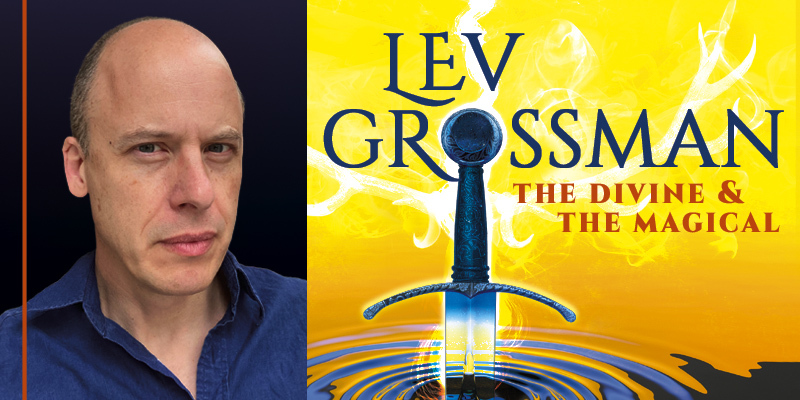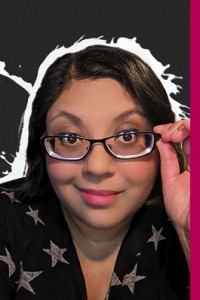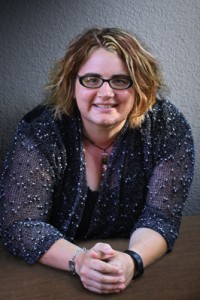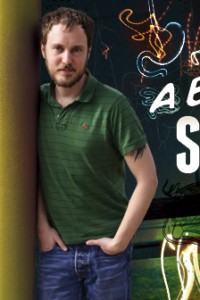Lev Grossman: The Divine & The Magical

LEV GROSSMAN was born June 26, 1969 and grew up in Lexington MA. He graduated from Harvard in 1991 and worked toward a PhD in comparative literature at Yale for three years, leaving before finishing his dissertation. He moved to New York, where he became a journalist and novelist. From 2002 to 2016, Grossman was a book critic and senior writer for TIME magazine, where he covered the internet, video games, comics, and other aspects of popular culture. He has written for The New York Times, Salon, Entertainment Weekly, The Village Voice, and numerous other publications. He has served on the board of directors for the National Book Critics Circle, and as chair of their Fiction Awards panel.
First novel Warp was published in 1997, followed by Codex (2004). While both referenced SF, neither was speculative. He turned to fantasy with The Magicians (2009), followed by sequels The Magician King (2011) and The Magician’s Land (2014). The series was adapted as TV show The Magicians, running for five seasons from 2015 to 2020. There are also graphic novel adaptations and continuations created with Lilah Sturges & Pius Bak, including Dragon Award winner The Magicians: New Class (2020). His short story ‘‘Endgame’’ (2011) is set in that same world.
Another of Grossman’s rare short stories, time-loop teen romance ‘‘The Map of Tiny Perfect Things’’ (2016), was adapted as film of the same name in 2021.
His middle-grade fantasy novel The Silver Arrow (2020) was a Mythopoeic Award finalist and was followed by sequel The Golden Swift (2022).
Grossman’s latest novel, The Bright Sword (2024), takes on the saga of King Arthur and his succession.
He won the Campbell Award for Best New Writer (now the Astounding Award) in 2011. After living in Brooklyn for years, he relocated to Sydney Australia in 2022, where he lives with his wife Sophie Gee (married 2010) and children.
Excerpt from the interview:
“I’ve always loved stories that are retellings from a surprising point of view, like Wide Sargasso Sea or Rosencrantz & Guildenstern Are Dead, that turn the POV around to suddenly reveal all these things about the story that you never knew were there. So I loved the idea of taking on Dinadan, who’s sort of the wit of the Round Table, but is never at the center of the story – he’ll get off a couple lines in the Great Hall, and then you don’t hear from him again. But if you go back to his story, and really think about this guy who’s never the hero, who is always chipping in with jokes, and you realize he’s got something within himself that he’s defending quite carefully, because that’s what humor does – it avoids serious questions, so he’s deliberately deflecting attention from himself. Likewise, with Palomides – no one ever talks about where Palomides came from, or why he could possibly have come to Britain and why he would stay. It’s another piece of blank space on the map, and it’s such a wonderful opportunity.
“So almost for my own benefit, I had to go through these characters and think about where they came from. And of course, I was thinking about The Canterbury Tales, and the way that Chaucer structures that. My knowledge of medieval literature is not amazing, but I do know my Chaucer, and, formally, I thought it was something wonderful and very medieval-feeling, very appropriate, to borrow from that structure.
“We don’t know too much about T.H. White because we haven’t got a proper biography, but we’re pretty sure he was gay – but he couldn’t write about that. There’s clearly an enormous part of his personal life and his emotional experience that he can’t write about in his great masterpiece, because the world’s not ready to read about a gay knight. But it’s ready now. So what a great opportunity, that White never had, but I do, to tell that story. And of course I’ve already heard from people who don’t want to hear the story of a gay knight. But there are gay people in the NBA, there are gay people in the NFL, there are going to be gay people at the Round Table. Let’s talk about it.
“That was something that happened with The Magicians. I wouldn’t say Elliot is straightforwardly gay, but he’s sexually very fluid, and prefers to be with men, and I wrote him that way because I know people like that – he’s partly based on my roommate in college. It never occurred to me that making him that was a choice that people would take as a statement. But at the time, there were not very many gay characters in fantasy, and people really responded to seeing that kind of representation. So of course I wanted to push that further, but most of all I was looking for stories that hadn’t been told, or at least told to death, and there were still so many.
“You won’t find much resistance to that in New York publishing. But The Bright Sword was written during the Trump years – or, a lot of it was – and I thought often about the fact that 70 million people voted for Trump, because a lot of those people don’t want to hear these stories. So I really tried so hard to tell them as human stories, and not to show everybody how woke I am. I came to those stories as a straight white guy, myself, but those stories touched a very human part in me, and I felt sure that if I could tell them the right way, that even people who weren’t interested could find something in them to respond to.
“The book took a long, long time to write, much longer than I anticipated. I started writing it in 2015, so it took ten years to put it all together. What took a long time was the characters and the research – I’m not a medievalist, so I had to spend a lot of time learning. Arthur is complicated by the fact that he kind of exists in two periods at once. Everybody is fairly confident that he would have lived in the sixth century, in the later Dark Ages, if by ‘Dark Ages’ we mean the 200 or so years after the Romans left. But medieval writers used him to write about their own times, so, when Malory writes about Arthur, Arthur is wearing plate mail and he’s going to tournaments and living in castles – he has the life of a 14th- or 15th-century knight. So he sort of exists in two periods at once, and that means you have to research two periods at once. I really had to do deep dives into both of those periods, which took a long time. Fortunately, we don’t know that much about sixth-century Britain, so I got to make a lot of stuff up. Even then, I had to be sure about which stuff I could make up and which stuff had to stick to what happened. That was a long process for me, and I couldn’t really be free with the historical detail – I really had to look at everything and check everything that I could. Maybe it’s just being an inexperienced historical novelist, but I didn’t know what I could fudge and what I had to really nail down, so I ended up nailing down everything that I could, which was a lot.
Interview design by Francesca Myman
Read the full interview in the October 2024 issue of Locus.
 While you are here, please take a moment to support Locus with a one-time or recurring donation. We rely on reader donations to keep the magazine and site going, and would like to keep the site paywall free, but WE NEED YOUR FINANCIAL SUPPORT to continue quality coverage of the science fiction and fantasy field.
While you are here, please take a moment to support Locus with a one-time or recurring donation. We rely on reader donations to keep the magazine and site going, and would like to keep the site paywall free, but WE NEED YOUR FINANCIAL SUPPORT to continue quality coverage of the science fiction and fantasy field.
©Locus Magazine. Copyrighted material may not be republished without permission of LSFF.






